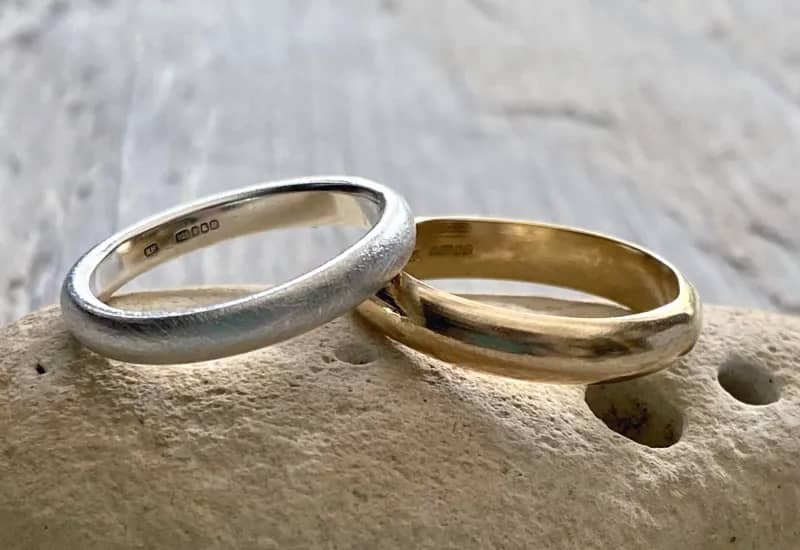Are you looking to make an informed choice when buying metal jewelry? Do you want to ensure that your purchase is both ethical and sustainable? If so, then this article is for you. Here, we’ll discuss the options of ethical gold and recycled silver when it comes to metal jewelry, and explore why these choices are the best for the environment. We’ll also look at what to look for when selecting jewelry made from these metals. So, if you’re interested in making sustainable metal choices, read on to find out more.
1. The Impact of Mining on the Environment
Mining for metals like gold and silver has a dramatic impact on the environment. The process of extracting these metals from the ground can create harmful byproducts, such as dust, acid, and other toxic substances. These pollutants can be released into the air, water, and soil, which can cause health and ecological problems. Additionally, mining can damage the landscape, including deforestation, soil erosion, and destruction of habitats.
There are several ways to reduce the environmental impact of mining. One option is to use sustainable metal choices, such as ethical gold and recycled silver. Ethical gold is produced from gold mines that adhere to strict environmental and labor standards, while recycled silver is made from existing materials, such as scrap jewelry. These sustainable metal choices can reduce the need for mining and reduce the overall environmental impact.
In addition to choosing sustainable metal options, it is also important to invest in technologies that can reduce the environmental impact of mining. For example, mining operations can use technologies such as waste management systems, water treatment systems, and dust control systems. These technologies can help to reduce the amount of pollutants released into the environment.
Finally, it is important to understand the potential environmental impacts of mining and to take steps to reduce them. Sustainable metal choices, such as ethical gold and recycled silver, and technological solutions can help to reduce the environmental impact of mining.

2. The Benefits of Recycling Metals
Recycling metals is an important step towards a sustainable future. Not only does it reduce the amount of waste in landfills, but it also saves energy and reduces greenhouse gas emissions. Here are some benefits of recycling metals:
1. Conservation of natural resources – Recycling metals reduces the need for mining, which can cause environmental damage and disrupt ecosystems.
2. Energy savings – Recycling metals requires less energy than mining and refining new metals. For example, recycling aluminium saves 95% of the energy required to produce it from raw materials.
3. Reduced greenhouse gas emissions – Mining and refining metals are energy-intensive processes that generate a significant amount of greenhouse gas emissions. By recycling metals, we can reduce these emissions.
4. Economic benefits – Recycling metals creates jobs and contributes to the economy. It also reduces the cost of producing new metals, which can lead to lower prices for consumers.
Recycling metals is not only good for the environment, but it also makes economic sense. By choosing recycled metals, you can support sustainable practices and contribute to a greener future.
3. Understanding the Difference Between Gold and Silver
Gold and silver are two of the most popular metals in the world, but they are not the same. Understanding the difference between gold and silver can help you make more informed decisions when it comes to buying jewellery or other metal-based products. Here are some key differences:
- Colour: Gold is a bright, yellowish metal, while silver is a shiny, white metal.
- Value: Gold is generally more valuable than silver, due to its rarity and demand.
- Durability: Gold is a softer metal than silver and is more prone to scratches and dents.
- Tarnishing: Silver is more prone to tarnishing than gold, but it can be easily cleaned with a polishing cloth.
- Uses: Gold is often used in jewellery and as a store of value, while silver is used in a variety of industries, including electronics and photography.
It’s important to note that both gold and silver can be produced in ethical and sustainable ways. Ethical gold is certified to have been mined without harming people or the environment, while recycled silver is sourced from existing metal, reducing the need for new mining.
For more information on sustainable metal choices, visit the Ethical Jewellery Australia website.
4. The Role of Fair Trade in Sustainable Metal Choices
Fair trade is an ethical approach to production and consumption that emphasizes the rights of producers and consumers in developing countries. Fair trade seeks to ensure that producers are paid a fair price for their work and that products are produced in an environmentally sustainable manner. Fair trade initiatives have been instrumental in promoting sustainable metal choices, such as ethical gold and recycled silver.
Fair trade gold is mined with minimal environmental and social impact. It is certified by the Fairtrade Foundation, which ensures that miners are paid a fair wage and have access to safe working conditions. In addition, Fairtrade gold is mined using responsible methods that minimize the environmental impact of mining and protect local ecosystems.
Recycled silver is also produced in an environmentally sustainable manner. This metal is made from recycled materials, such as scrap metal, jewelry, and electronics, and does not require additional mining or refining. By using recycled silver, consumers can reduce their environmental impact and support sustainable metal choices.
Fair trade initiatives provide an important framework for promoting sustainable metal choices. By supporting Fairtrade gold and recycled silver, consumers can ensure that their purchases are produced in an ethical and environmentally responsible manner.
5. The Availability of Ethical Gold and Recycled Silver
When it comes to sustainable metal choices, ethical gold and recycled silver are two great options to consider. Ethical gold is sourced from mines that are free from human rights abuses and environmental damage. Recycled silver is obtained from scrap metal and old jewellery, reducing the need for new mining.
One of the challenges of using ethical gold and recycled silver is their availability. Ethical gold is still a relatively niche market, and not all jewellers offer it. However, there are organisations such as Fairtrade Gold that certify ethical gold mines and make it easier for jewellers to access it. Recycled silver is more widely available, as it can be sourced from scrap metal dealers or even from old jewellery that you no longer wear.
It’s important to note that choosing ethical gold and recycled silver doesn’t mean sacrificing quality or style. Many designers are now incorporating these materials into their collections, creating stunning pieces that are both beautiful and sustainable.
By choosing ethical gold and recycled silver, you can make a positive impact on the environment and support fair labour practices. So next time you’re shopping for jewellery, consider these sustainable metal choices.

6. Tips for Shopping Sustainable Metal Choices
When shopping for sustainable metal choices, it is important to be mindful of the materials used and the processes involved. Here are 6 tips to help you make ethical and sustainable metal choices when shopping for gold and silver:
- Research the source of the metal. Check with the seller to make sure the metal is from a responsible and certified source, and avoid metals with unknown origins.
- Look for recycled metals. Many jewellery makers are now offering recycled gold and silver, so look for these options where possible.
- Check for certifications. Look for certifications such as Fairtrade Gold, which guarantee the metal is responsibly sourced and produced.
- Shop from ethical jewellers. Look for jewellers who are committed to sustainability and ethical practices in their sourcing and production processes.
- Avoid plated metals. Plated metals are often made from non-sustainable materials and are not recyclable.
- Look for eco-friendly packaging. Many sustainable jewellers use recycled or biodegradable packaging, so look out for these options.
For more information on sustainable metal choices, check out the Ethical Jewellery Australia website.

Conclusion:
As the jewelry industry becomes more conscious of its environmental and ethical impact, sustainable metal choices like ethical gold and recycled silver are gaining prominence. These metals offer an eco-friendly alternative without compromising on quality or aesthetics. By opting for sustainable metals, consumers can enjoy beautiful jewelry pieces while also supporting responsible mining and recycling practices.
